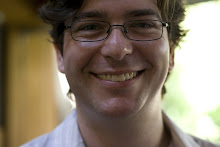The Passage of Time
18/09/07
Gollinhac, France
Outside now the daylight has just begun its wane, the sun having set behind the hill this town covers. Gollinhac sits high above the surrounding valley floors, a verticle difference of some 1500ft, and the view from this perch stretches into the tens of kilometres. On the surrounding lower valley walls small villages and hamlets cling, each marked by a small stone church spire - visible, like the golden domed gurdwarras of the Punjab, for miles. I'm reminded again of the organisational sentiment of such physical expressions of faith - 'Where the church spire can be seen, there the parish lies.' Here the parish is everywhere, church spires visible in all directions.
France seems quite actively secular in a thoroughly Catholic way. Yet the cultural influence of Christian history is strong. Here in rural France time is a very regulated commodity. The day begins at the civil hour of 7am with the ringing of the church bells, and people begin to eat their breakfast (7:30 is also quite usual). From after breakfast until midday shops tend to be open (apart from Sundays and Mondays) and businesses run. However, come 12pm the nation, or at least these silvan parts of it, stops. For the hungry traveller caught out by the vicissitudes of the march between towns the period between 12 and 2pm can be dispiritingly cuisineless. Best to have procurred a baguette, saussicon, cheese, and an apple beforehand. A chorus of rumbling bellies often the only sound one hears during these hours. After this the towns burst into activity again anew, and the roads into and out of town can often be a danger to the famished pilgrim, senses dulled by starvation.
As such the day continues until 6:30pm when public life again begins to grind to a halt. At ten to six the church bells ring, calling the faithful, penitent, hungry, or bored to attend to their sins before the most strictly regulated of all the daily events - Dinner. 7pm is, without exception or variation, the time one eats, drinks, and talks around the dinning table. Often, despite typically mid-sized meals, this will last until 9:30pm, at which time people wander off to bed. By 10pm the cobbled streets and alleyways are empty. The townsfolk sleeping, readying themselves for the new day tomorrow.
It is, for a foreign walker (and worker) who speaks little of the language and knows less about the cultural vagaries, a maddening, infuriating way to run the world.
The thing is, I love it!! It makes the working life secondary to family life. The day revolves around the table - breakfast, lunch, and dinner - at which every day all the members of the family sit. School, work, fields, all are secondary to the family table. Everyone returns home.
It is a heirarchy I could live with.
More: Full post



